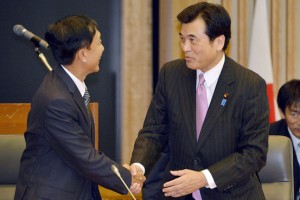Posts Tagged ‘Asian Development Bank’ (8 found)
Asian Highway Project Undermines Peace in Karen State
(10 July 2015) – The Karen Peace Support Network (KPSN) is alarmed by recent fighting between the Burma Army and the Democratic Karen Benevolent Army (DKBA) along the recently completed section of the Asian Highway between Myawaddy and Kawkareik. The Burma Army began heavy fire on DKBA positions along the road in the early morning of 2 July. Fighting has lasted for one week, has spread to other parts of Karen State, and tensions remain high. This is the fourth instance of armed clashes in the area in the past year, breaking out amidst rising tensions over control of the highway, which is slated to officially open later this month […]
• • •Bridge Loans to the Republic of the Union of Myanmar
Promoting Medium-Long Term Development of Myanmar through Supporting Its Return to the International Financial Market
The Japan Bank for International Cooperation (JBIC; Governor: Hiroshi Okuda) provided bridge loans (short term bridging loans) with the Republic of the Union of Myanmar on January 17, about 512 million U.S. dollars to clear the arrears of past loans from the Asian Development Bank (ADB), and on January 25, 430 million U.S. dollars to also clear the arrears of past loans from the International Development Association (IDA), one of the World Bank Group […]
• • •Campaigners Criticise “Premature” Burma Debt Cancellation
$5.9 billion to be written-off and new loans to military dictatorship to begin.
Western countries, in a body called the Paris Club, have agreed to cancel 50 per cent of the debt owed to them by Burma. The World Bank and Asian Development Bank have also agreed to start lending to the Burmese government again. The move comes after the Burmese government signed-up to a set of IMF economic conditions earlier this month […]
• • •New Lending Must Address Challenges on Burma’s Road to Development
 On 11 October, Japan announced that it would be resuming loans to Burma. It also hinted that it will assist the heavily indebted country in clearing its arrears and establishing good financial standing with international financial institutions, such as the World Bank and the Asian Development Bank.
On 11 October, Japan announced that it would be resuming loans to Burma. It also hinted that it will assist the heavily indebted country in clearing its arrears and establishing good financial standing with international financial institutions, such as the World Bank and the Asian Development Bank.
Japan will be forgiving US$3.7 billion or about 60% of the total $6 billion debt Burma owes; it is also planning to use bridge loans by Japanese banks to help clear Burma’s $900 million of arrears with the World Bank and the Asian Development Bank. Japanese Finance Minister Koriki Jojima stated, “Japan is planning to resume its full program in Myanmar with yen loans to help support Myanmar’s sustainable economic development…at the earliest possible timing next year.” He further explained that Japan’s development priorities in Burma would focus specifically in the areas of electricity and road rehabilitation, rural development and improvement of port facilities.
At this moment in time, Burma’s re-entry into the world economy, specifically the ability to take loans from institutions such as the World Bank, the Asian Development Bank and Japan itself, carries great risk. The type of projects to be funded, the rate of investment, the sectors in which investment will take place, the presence of monitoring mechanisms, and the decision-making process are just some of the factors that will determine the long-term outcome of international financial support […]
Myanmar in Transition: Opportunities and Challenges
Myanmar, which is emerging from decades of isolation, is poised to accelerate its economic growth on the back of its abundant labor force, rich natural resources, and geographical location. But the country faces many development challenges to achieve strong and inclusive growth […]
• • •The ADB in Burma: Behind the Scenes
This paper recommends that until the people of Burma can meaningfully participate in development decisions, preconditions for responsible investment are in place, and adverse impacts can be mitigated, then the ADB should refrain from any form of new engagement with Burma. If they do engage (i.e., fund, facilitate, administer) in Burma, the ADB must follow the International Financial Corporation’s “Sustainability Framework” and adhere to their own safeguard policies, including safeguards on Involuntary Resettlement, Environment and Indigenous People, as well as the ADB’s Accountability Mechanism and Public Communications Policy […]
• • •Opportunities and Pitfalls: Preparing for Burma’s Economic Transition
The Burma Project/Southeast Initiative has published Opportunities and Pitfalls: Preparing for Burma’s Economic Transition, a report by Yuki Akimoto.
Opportunities and Pitfalls covers key topics addressed at the conference regarding Burma’s prospective economic transition and the role of IFIs. The report contains case studies of other countries that have dealt with IFIs and their prescriptions for development, highlighting issues and circumstances that Burma shares with those countries.
Forward-looking and accessible, this report promises to stir practical debate about how Burma should manage the challenges of working with IFIs when these institutions become fully engaged there […]
• • •Multilateral Development Banks and Burma: A Resource Book from the Bank Information Center
Multilateral development banks, or MDBs, are a significant source of economic assistance for developing countries. MDBs lend tens of billions of dollars to low and middle income countries each year. In the Asia-Pacific region, the Asian Development Bank (ADB) loans $5 to 6 billion a year to its borrowing countries. If and when the MDBs decide to resume engagement with Burma, they could be a very large source of financial support for Burma’s development agenda.
Many of those in the movement to promote democracy in Burma have engaged in debates and discussions about whether or not economic assistance should be extended to the military regime. The Resource Book is meant to help expand this discussion to include the issue of multilateral assistance from MDBs […]
• • •








 All posts
All posts